John Kerry joined Iran nuclear negotiations in Vienna as they entered a hectic final phase on Thursday night, fighting growing scepticism that they can be completed by the Monday deadline.
The US secretary of state was due to hold late-night talks with his Iranian counterpart, Mohammad Javad Zarif, in a last-ditch attempt to break the deadlock on unresolved issues.
But a former senior State Department official, involved in Middle East policy until only a few weeks ago, said it was now not “physically possible” to conclude a comprehensive agreement in the time remaining. He argued that an extension of up to six months might be necessary.
Speaking in Paris before boarding his flight to Vienna, Kerry sought to play down remarks the previous day by his British counterpart, Philip Hammond, suggesting that the deadline would have to be extended.
“We are not discussing an extension. We are negotiating to have an agreement. It’s that simple,” Kerry said in Paris before boarding the flight to Vienna. “I know that Secretary Hammond is concerned about the gaps. We all are.
“Both sides are taking this process seriously and both sides are trying to find common ground. That does not mean we agree on everything. But it does mean we have discussed in detail the full range of relevant issues that have to be part of a durable and comprehensive agreement.”
The official policy of the Americans and the Iranians at the Vienna talks has been to insist they were not discussing an extension, lest it remove the sense of urgency required for last-ditch concessions to make a deal. However, with the deadline looming, confidence behind the scenes about completing an agreement on time is beginning to ebb.
“Inevitably, there’s going to be an extension. The question is just what kind of extension it is. Is it a major announcement, like a declaration of principles, where you basically outline all the key parameters that they work out; or is it something where they do nothing but just extend? ” said Ilan Goldenberg, a former senior State Department official, wholeft the government last month.
“The idea that they’re actually going to work out all the details by next week is not physically possible. But if they have a declaration of principles or a framework that’s essentially worked out, you’ve just got to get all the geeks and sit down and go through it in a very intensive way. But the idea that they’ll walk out of there next week with a 40-page document that’s worked out to the nth degree, that’s not going to happen.”
Goldenberg, who previously worked on Iran policy in the Pentagon, predicted the negotiations could be given up to an extra six months.
“I don’t think there’s an interest on either side to be constantly [deferring]. I think they’ll want it to be as long as possible, because it’s a huge headache every time you come up against a deadline,” he said. “It’s a ton of work for the president, and the secretary of state, and people at that level. I don’t think they want to be doing that every three months. If you give them six months, the technical teams and the negotiators can go work it for six months and figure something out.”
However, some observers at the Vienna talks argued that such a long delay was unfeasible and unlikely, as it would only strengthen opponents of an agreement in both Washington and Tehran.
Reza Marashi, the research director of the National Iranian American Council, who is monitoring the talks in the Austrian capital, argued: “An extension is a possibility, should the two sides not be able to close the gaps, but it carries its own risks.
Hardliners in Congress and within Iran will have more time to throw up obstacles and wreak political havoc on the forces in both the US and Iranian administrations seeking to finalize a deal. While the gaps are few, they are significant, but the mood here in Vienna is determined.”
Goldenberg argued that the closer the negotiators came to the deadline, the less the outside world would know about the negotiation.
“Near the end, everything shuts down, we’re not talking to anybody from the press, we’re not briefing anyone from the outside,” he said. “Everything is very fluid. The bottom lines start to come on the table. Things start to get tested. People aren’t sleeping for days at a time. They’re getting into that mode over there right now.” You’re not going to know until you know.”
In Paris, Kerry had held talks with the French and Saudi Arabian foreign ministers, intended to maintain the support of both countries – among the most hawkish on Iran – for the negotiations over a comprehensive deal.
Meanwhile, the director general of the International Atomic Energy Agency (IAEA), Yukiya Amano, complained that Iran had not been cooperating with the agency’s inquiry into evidence of past Iranian development work on nuclear weapons.
“I call upon Iran to increase its cooperation with the agency and to provide timely access to all relevant information, documentation, sites, material and personnel,” Amano told the IAEA’s governing board, made up of the organisation’s member states.
All sides at the Vienna talks have agreed that the resolution of the IAEA’s enquiry into past weaponisation work will only be achieved at some later date over the lifetime of a comprehensive deal, when it will be tied to the lifting of the last sanctions on the country.
Before travelling to Paris, Kerry met the Omani foreign minister, Yusuf Bin Alawi, twice in London. Oman has been an important intermediary in the past between Washington and Tehran, and Alawi met P0resident Hassan Rouhani and aides to Iran’s supreme leader on a visit to the Iranian capital last weekend.
In Paris, Kerry met the French foreign minister, Laurent Fabius, and his Saudi opposite number, Saud al-Faisal. Both have been sceptical of Iran’s intentions and have opposed concessions that leave Iran with a significant uranium enrichment capacity. At last year’s negotiations in Geneva for an interim deal with Iran, Fabius staged a last-minute intervention, declaring that France would not accept what he described as a “fool’s game”.
Kerry is said to be concerned about similar friction among the western powers in the last critical days of the Vienna talks.
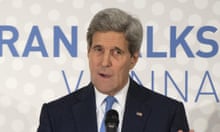

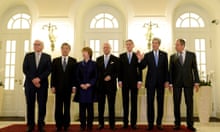
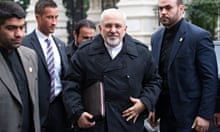
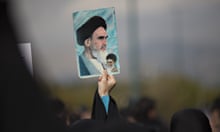
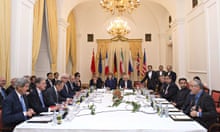
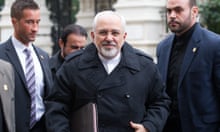
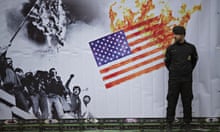

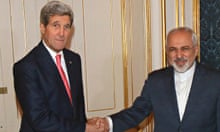
Comments (…)
Sign in or create your Guardian account to join the discussion